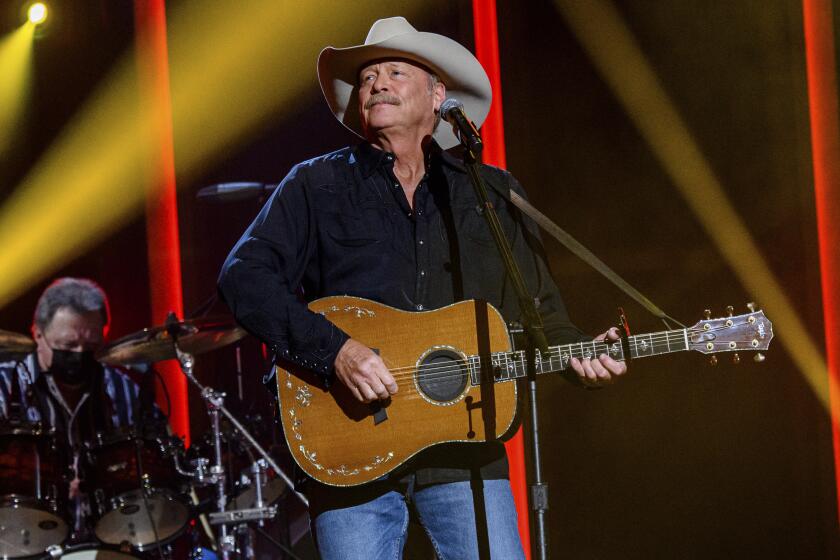‘Jacquet’s Got It!’ With His Own Big-Band Recording
- Share via
“I’ve heard big bands all my life,” said saxophonist Illinois Jacquet. “My father had a big band when I was 3. I used to dance and sing in front of his big band. After high school, I joined some of the name bands, Lionel Hampton (1941-42), Cab Calloway (1943-44), Count Basie (1945-46).
“These were the greatest bands in the world I appeared with. When I got my band in 1983, I knew what I had to do. If I’m going to have a big band, they’re going to have to sound equally as good as what I’m used to hearing.
“This is our first record with this big band.”
In fact, “Jacquet’s Got It!” released recently on Atlantic Records, featuring the band he has led since 1983, is his first in America on a major label in 20 years. He has recorded in Paris, London and Tokyo during that time.
“We had a great response at every show at the Blue Note (in New York),” Jacquet, 65, said. “It’s sort of like starting out again. You look at those grueling one-nighters. But if your life is devoted to music, you wind up--that’s what you do.
“I’m happy now doing what I’m doing. Please believe me, I’m working hard but it’s not affecting me because the music is keeping me going.”
Pianist Nat (King) Cole was Jacquet’s biggest musical inspiration. “When I went to Los Angeles (in 1940) I met him,” Jacquet said. “He became my best friend in jazz until his death.
“He liked what I was playing. He knew Benny Goodman was going to disband his band in Catalina Island. Lionel Hampton started a band. He hired the King Cole Trio to be his rhythm section. Nat said, ‘I’m going to introduce you to Lionel. He’s coming in tonight; we’ll have a jam session.’ That was before Nat was singing. He wasn’t making those millions yet.
“We had a big jam session that night, at the Radio Room in Hollywood. Lionel asked how I’d like to join his band. I was unemployed; I’d like to join anybody’s band. Lionel said he’d like me to switch to tenor sax. That’s the last thing I thought I was going to hear. I thought I was doing all right on alto sax. Lionel wasn’t thinking about me; he was thinking about a sound that would develop a band.
“I joined Lionel’s band when I was 18.” They recorded and traveled but the King Cole Trio wasn’t the rhythm section.
“Nat and I stayed in touch,” Jacquet said. “My band and his trio toured all over America in 1953. He was singing then; he said he was going to the Brinks Bank. But when he played the piano it was a different chill than you ever had.
“The most intriguing part of my life was playing with Nat before he became famous. I’m glad he became famous. But it was phenomenal what a piano player and bass could do. Put a sax player in there! We were doing some wonderful things.
“He is the only piano player I ever knew played behind Art Tatum, and you didn’t miss Art Tatum. One night at a jam session he sat down when Art Tatum got up. Nat was like a young Earl Hines. No one could ever come near Art Tatum, but he did. I’ll always cherish those moments.
“Nat was an inspiration to me up to his death. I still have all his records. He was such a polished entertainer and musician. He was like a minister, a quiet, unique, comical, polished human being. He dressed like a prince, like a king.”
Jacquet, who formed his first combo in 1944 and his first big band in 1947, took part in a benefit concert July 3, 1944, presented by Norman Granz to repair damage in Los Angeles from a race riot. He said, “It was at the Philharmonic Auditorium. There was a Federation of Musicians strike and no recording. That night the Army came in with equipment and recorded us for the fighting soldiers.
“You do things when you’re not in the studio making records; you’re loose. I did things I had never played on my horn. Nat was playing piano behind me at that concert. He brought things out of me I would never have thought of doing.
“When the war was over, the Army turned those tapes over to Norman Granz. He put out Volume 1, on up, of ‘Jazz at the Philharmonic.’ My solo on ‘Philharmonic Blues Part 2’ they took out of the Volume 4 album and made a single for the jukeboxes.
“Jazz at the Philharmonic tours were created into one of the giants of jazz. It increased salaries of jazz musicians. Jazz went from the saloons to the concert halls. I toured with Jazz at the Philharmonic every year--I might have missed a few--to 1957. The 1957 concert, at the Hollywood Bowl, was Art Tatum’s last concert before his death.”
Jacquet explained how he acquired his name.
He said, “My mother was a full-blooded Sioux Indian. One of her relatives was a nurse in Chicago. She came to Broussard, La., to help deliver me. That’s where the Illinois came from.”
His grandfather was named Jean Baptiste Jolivet Jacquet. The nurse thought one of his names should be Indian, signifying his mother, so he became Jean Baptiste Illinois Jacquet.
More to Read
The biggest entertainment stories
Get our big stories about Hollywood, film, television, music, arts, culture and more right in your inbox as soon as they publish.
You may occasionally receive promotional content from the Los Angeles Times.










